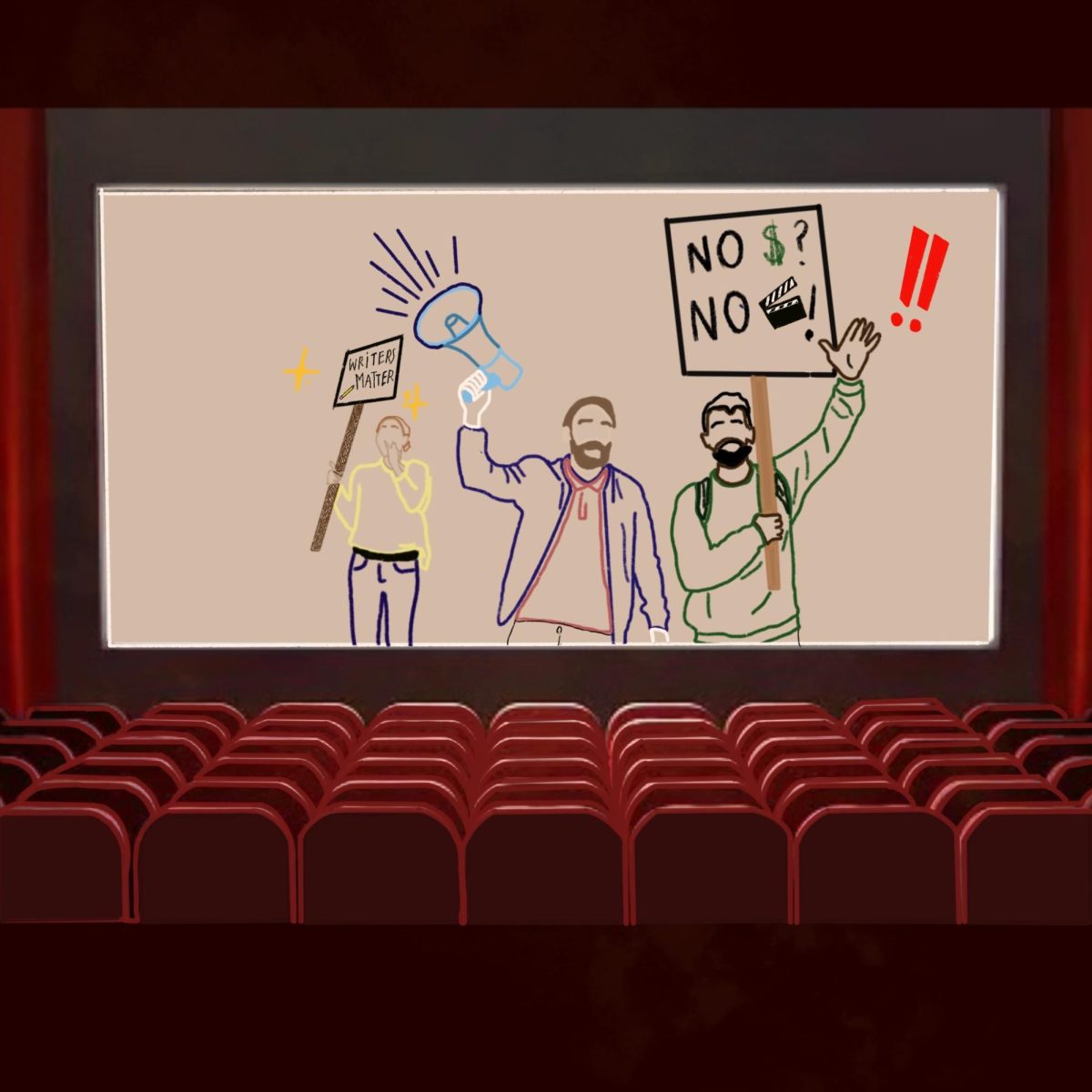On May 2, 2023, the Writers Guild of America went on strike. The WGA is a labor union that was formed on April 6, 1933 (originally the Screenwriter’s Guild) to protect and represent writers in film, television, radio and other forms of media across America.
As of Aug. 1, 2023, the WGA has been on strike for 13 weeks demanding livable wages and compensation. Writer Ethan Blume wrote a detailed overview of the strike back in late May. Since then, another union has gone on strike to shake the pillars of Hollywood.
On July 14, 2023, the Screen Actors Guild – American Federation of Television and Radio Artists went on strike. SAG-AFTRA is a labor union that was formed on March 30, 2012, to protect and represent performers in film, television, radio and other forms of media across America.
Like the WGA, SAG-AFTRA has attempted to negotiate with studios to create new contracts that fit our world of streaming and artificial intelligence. Yet, studios have denied SAG-AFTRA’s demands, choosing to prioritize the wealth of their CEOs and shareholders. Because of this, everyone from A-list blockbuster-starring actors to background extras are striking to make a change. Many outside of the situation seem to be confused about why this strike is happening and what it means for media and the country as a whole. Hopefully, by the end of this story, you can understand why supporting the WGA and SAG-AFTRA is so important.
The Negotiations
Let’s begin by first looking at the biggest requests SAG-AFTRA made while attempting to negotiate with studios. One thing the union asked for was an 11% general wage increase, which would give inflation recovery to their performers. The studios refused this, offering a 5% increase, which would mean wages lower than wages in 2020.
Another demand was that of better compensation and residuals from work done in streaming. Since content that goes to streaming isn’t individually paid for like a movie ticket or an episode of television on iTunes, much of the revenue that should be compensating the labor of performers gets taken by the streaming companies. SAG-AFTRA presented a plan that would allow performers to receive some of this revenue, but the studios refused to engage with the idea entirely.
Lastly, an important subject to SAG-AFTRA was ensuring artificial intelligence would not be used to take the images of their actors and replace human performances. The studios dismissed this, claiming they wanted to scan the likenesses of background actors, pay them a half day’s wage, and then use their digital scans for any purpose they sought in the future. Beyond that, they hoped they would be able to use A.I. to replicate the images and voices of performers to create new scenes and train A.I. programs. All of this was planned to be done without the consent or compensation of the performers used. WGA and SAG-AFTRA demands are more than reasonable, yet, studios refuse to agree to them. So here we are.
There are still some that will see SAG-AFTRA’s requests and question their necessity. For example, I’ve seen some folks question why actors like Chris Hemsworth or Dwayne Johnson should be striking for higher compensation when they already get paid so much. People who have asked these questions seem to believe that acting as a whole is a job for wealthy people. In reality, it’s just as blue-collar as being an electrician.
The majority of those in SAG-AFTRA are performers scrambling to survive in the business. Some even work upwards of two jobs on top of attending auditions and performing in small roles. For most, acting is not a livable profession, but their passion for the art form keeps them going.
The Threat of A.I.
To most, the ideas studios brought up with the usage of A.I. is horrifying. For the few who still remain unaffected, allow me to change that.
Imagine you’re an actor just trying to break through, taking jobs as background characters in crowds. You agree to have your body scanned and your voice recorded for a few hours pay. Two months later, you see yourself in the background of a football game in a sports film you never worked on or got paid for. Five years later, you’re watching the latest horror movie about an evil cult and find there’s a scene featuring you murdering someone as one of the cult members. Again, you never shot this scene or were paid for it. Fifty years later, you have passed away but your grandchildren are well and alive. They go to see a new raunchy comedy where they see a 24-year-old version of yourself performing a sexual act. Not only are they watching something that could be truly traumatizing, but they will not receive a penny from that use of your image. This is a scenario that fits perfectly in the world studios intend to create with their usage of A.I.
If studios are able to accomplish this, it could be the catalyst for a world where more jobs are performed by A.I. than humans. With this in mind, it’s safe to say the WGA and SAG-AFTRA are not just striking for better compensation, but also a safer world.
I would like to leave you with a haunting quote from an anonymous studio executive given to “Deadline” just three days before SAG-AFTRA went on strike: “The endgame is to allow things to drag on until union members start losing their apartments and losing their houses.”
Members of the WGA and SAG-AFTRA need our support now more than ever. Whether that’s through donation or spreading the word, it’s our duty to make sure these unions are cared for. Studio executives like Bob Iger or David Zaslav have made it clear they have no intention of changing their million-dollar lifestyles even if it means hardworking people become homeless in the process. These unions striking may only appear to affect the world of film and television, but what it represents are far larger issues America faces as a whole. If you care about the health and well-being of yourself and your family, you care about the WGA and SAG-AFTRA striking.




